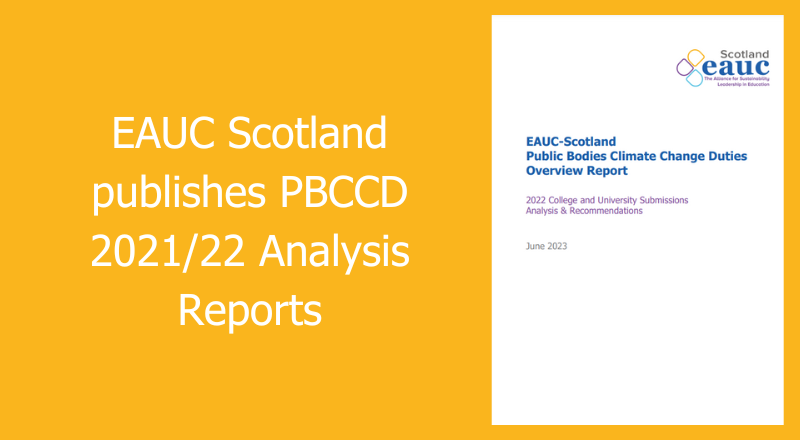Whilst sector reporting has improved again over the past year, there remains a gap between current reporting and the expectations set out by Scottish Government
EAUC Scotland has today published its latest PBCCD Analysis Reports for the Scottish college and university sector. With individual reports for colleges and universities, as well as one for whole sector, these reports analyse the sector's emissions reporting data to Scottish Government for the 2021/22 academic year (see below for downloads).
Key headline trends from the college and university analysis include:
EAUC Scotland will continue to support the sector to meet the latest Scottish Government guidance. Through our Scottish Funding Council funded programme, the team are working with key stakeholders to develop new tools, guidance and sector leadership to tackle key emission areas. Upcoming activities will include:
If you have any questions regarding the reports, please contact Matt Woodthorpe, EAUC Scotland Programme Manager via mwoodthorpe@eauc.org.uk.
Key headline trends from the college and university analysis include:
- Net greenhouse gas (GHG) emissions reported during 2021/22 were 730,750 tonnes of carbon dioxide equivalent;
- Total reported emissions increased by 125% since 2020/21 and by 59% since mandatory reporting began in 2015/16. This is primarily due to increased quality of reporting by institutions and should be viewed as a positive step. Previous reporting years, particularly for Scope 3 sources, can be viewed as significantly under-reporting sector emissions;
- The sector has made minimal progress in reducing absolute emissions from natural gas, particularly universities. Over the past 7 years reported emissions from natural gas have increased by 0.5% for the university sector, compared with a 10% reduction for the college sector. With the Scottish Government expectation of zero direct emissions from public body estate buildings by 2038, both Scottish colleges and universities must focus efforts to understand, reduce and decarbonise heating emissions;
- Business travel emissions have rebounded from 1,988 tCO2e in 2020/21 to 16,063 tCO2e in 2021/22. This remains significantly below pre-Covid 2018/19 emissions of 68,526 tCO2e; however, the sector and supporting sector agencies should look to lock-in changed travel habits and ensure emissions from business travel do not continue to rise in future reporting year. Aviation as a mode of travel accounted for 88% of the sector's total reported business travel emissions;
- Whilst sector reporting has improved again over the past year, there remains a gap between current reporting and the expectations set out by Scottish Government. The sector should ensure that all relevant emission sources are included in 2022/23 PBCCD reports to be compliant of the guidance. A complete and transparent emissions profile for an institution will also support better informed decision-making for reducing emissions.
EAUC Scotland will continue to support the sector to meet the latest Scottish Government guidance. Through our Scottish Funding Council funded programme, the team are working with key stakeholders to develop new tools, guidance and sector leadership to tackle key emission areas. Upcoming activities will include:
- Launching an International Student Travel Emissions Calculator Tool;
- Facilitating workshops with sector bodies focused on understanding and reducing sector business travel aviation emissions;
- Publishing guidance on how institutions can use the output from APUC’s Scope 3 Supply Chain Emissions Tool within PBCCD reporting and for supply chain engagement;
- Publishing a Climate Risk Register with accompanying guidance.
- Sector PBCCD Peer Review session (14th November 2023; online)
If you have any questions regarding the reports, please contact Matt Woodthorpe, EAUC Scotland Programme Manager via mwoodthorpe@eauc.org.uk.











